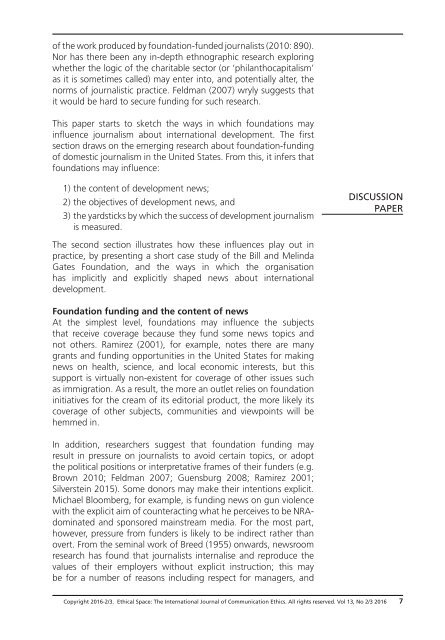Beyond clickbait and commerce
v13n2-3
v13n2-3
You also want an ePaper? Increase the reach of your titles
YUMPU automatically turns print PDFs into web optimized ePapers that Google loves.
of the work produced by foundation-funded journalists (2010: 890).<br />
Nor has there been any in-depth ethnographic research exploring<br />
whether the logic of the charitable sector (or ‘philanthocapitalism’<br />
as it is sometimes called) may enter into, <strong>and</strong> potentially alter, the<br />
norms of journalistic practice. Feldman (2007) wryly suggests that<br />
it would be hard to secure funding for such research.<br />
This paper starts to sketch the ways in which foundations may<br />
influence journalism about international development. The first<br />
section draws on the emerging research about foundation-funding<br />
of domestic journalism in the United States. From this, it infers that<br />
foundations may influence:<br />
1) the content of development news;<br />
2) the objectives of development news, <strong>and</strong><br />
3) the yardsticks by which the success of development journalism<br />
is measured.<br />
DISCUSSION<br />
PAPER<br />
The second section illustrates how these influences play out in<br />
practice, by presenting a short case study of the Bill <strong>and</strong> Melinda<br />
Gates Foundation, <strong>and</strong> the ways in which the organisation<br />
has implicitly <strong>and</strong> explicitly shaped news about international<br />
development.<br />
Foundation funding <strong>and</strong> the content of news<br />
At the simplest level, foundations may influence the subjects<br />
that receive coverage because they fund some news topics <strong>and</strong><br />
not others. Ramirez (2001), for example, notes there are many<br />
grants <strong>and</strong> funding opportunities in the United States for making<br />
news on health, science, <strong>and</strong> local economic interests, but this<br />
support is virtually non-existent for coverage of other issues such<br />
as immigration. As a result, the more an outlet relies on foundation<br />
initiatives for the cream of its editorial product, the more likely its<br />
coverage of other subjects, communities <strong>and</strong> viewpoints will be<br />
hemmed in.<br />
In addition, researchers suggest that foundation funding may<br />
result in pressure on journalists to avoid certain topics, or adopt<br />
the political positions or interpretative frames of their funders (e.g.<br />
Brown 2010; Feldman 2007; Guensburg 2008; Ramirez 2001;<br />
Silverstein 2015). Some donors may make their intentions explicit.<br />
Michael Bloomberg, for example, is funding news on gun violence<br />
with the explicit aim of counteracting what he perceives to be NRAdominated<br />
<strong>and</strong> sponsored mainstream media. For the most part,<br />
however, pressure from funders is likely to be indirect rather than<br />
overt. From the seminal work of Breed (1955) onwards, newsroom<br />
research has found that journalists internalise <strong>and</strong> reproduce the<br />
values of their employers without explicit instruction; this may<br />
be for a number of reasons including respect for managers, <strong>and</strong><br />
Copyright 2016-2/3. Ethical Space: The International Journal of Communication Ethics. All rights reserved. Vol 13, No 2/3 2016 7


